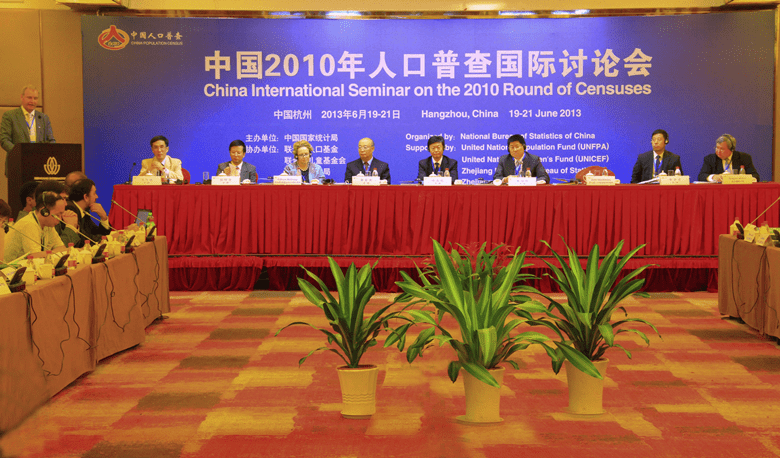June 19, Hangzhou---With support from UNFPA, the United Nations Population Fund in China and UNICEF, the United Nations Children’s Fund, National Bureau of Statistics (NBS) organized the China International Seminar on the 2010 Round of Census in Hangzhou from 19-22 June 2013. More than 120 delegates from 14 countries gathered to discuss the in-depth analysis and utilization of the results of the 2010 round of census taken in China and other countries, especially with relation to topics including assessment of data quality, ageing, migration and urbanization, fertility changes, health and mortality, family structures and social security programmes.
Mr. Zhang Weimin, Deputy Commissioner of NBS opened the seminar. He reported in his opening remarks that the 2010 round census was conducted successfully and has generated reliable data on China’s population and its structure, and revealed key challenges in population and development in China. Mr. Zhu Congqiu, Vice Governor of Zhejiang Province, said that the Provincial Government has provided various support including funding to conduct further research and analysis on the population data.
Mr. Arie Hoekman, UNFPA’s Representative to China, emphasized the importance of having reliable population data. “Good population data forms the basis of evidence-based development policies,” Mr. Hoekman said at the event. He pointed out that as China is experiencing a critical transitional period and is facing complex population dynamics, there is a great need for comprehensive policy responses. Therefore reliable population data should be provided in a timely manner to support a better understanding of the complex population dynamics and to devise inclusive and responsive development policies accordingly. Population census and it derivatives will play a vital role in generating such data.
At this seminar, south-south collaboration on census taking was also discussed. With support from UNFPA, NBS for the first time conducted its third population and housing census by using international standards and modern subsequent census technology in 1982. Subsequently, UNFPA continued to support national capacity in generating sex-disaggregated data in national statistics system. With remarkable achievements in census taking and data utilizations, China can potentially play a more actively role through strengthened south-south collaboration to support other countries in census taking in various ways.
As a concrete example of further use of census data, joint publications of Facts and Figures on Children and Ageing were disseminated at the Seminar. These easy-to-use Facts and Figures are generated from a joint data project between UNFPA, UNICEF and National Bureau of Statistics to conduct thematic analysis on priority population issues, including ageing, sex ratio at birth youth and children based on the results from the 2010 round of national census.


